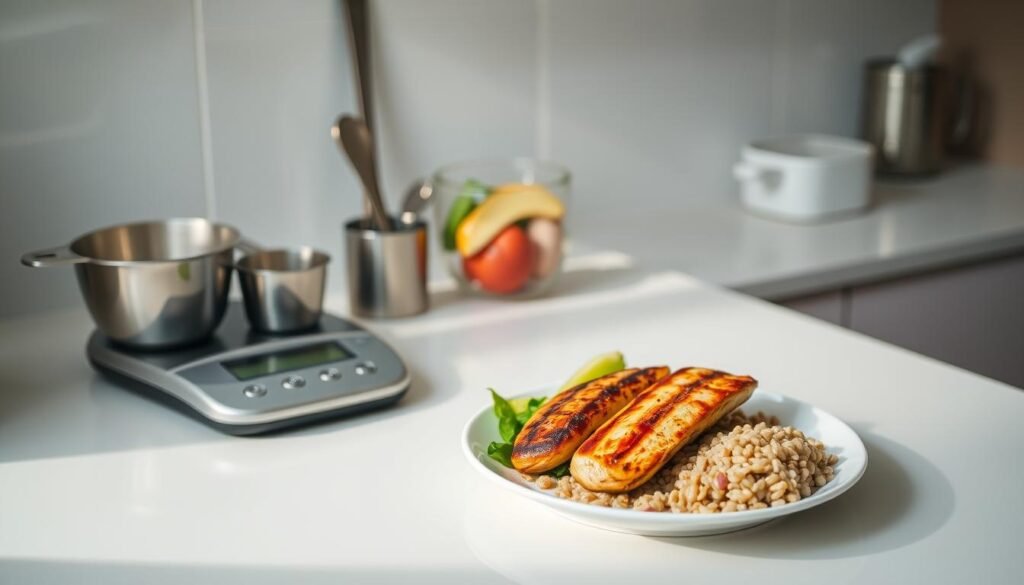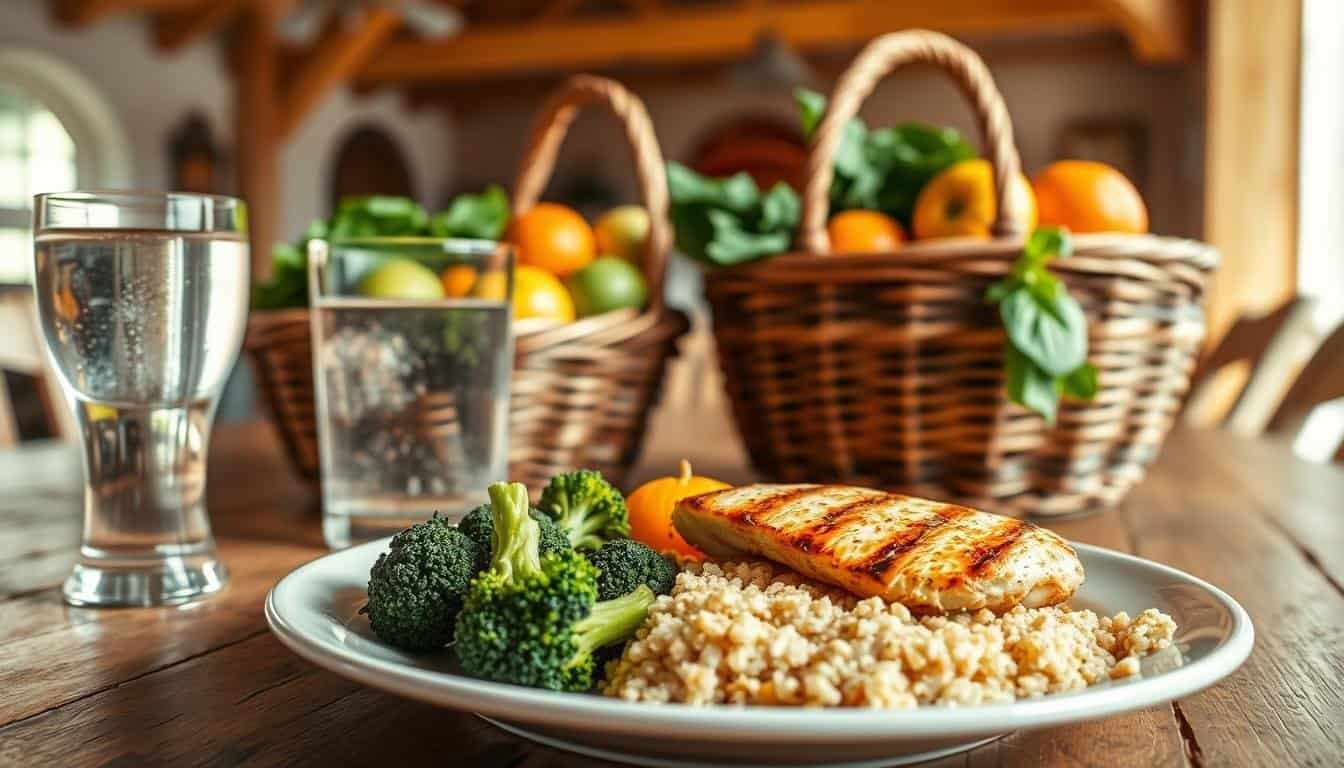Let’s face it—losing weight and keeping it off can feel like an endless battle. I’ve been there too, trying every fad diet under the sun only to end up right where I started. But here’s the thing: sustainable weight loss isn’t about quick fixes. It’s about making real lifestyle changes that you can stick with for the long haul.
My journey toward a healthier lifestyle began when I realized that focusing on balanced meals and mindful eating could make all the difference. It’s not about depriving yourself of foods you love, but about finding a way of eating that nourishes your body and keeps you satisfied.
If you’re wondering how to maintain a healthy diet for weight loss, the answer lies in consistency, preparation, and flexibility. In this article, I’ll share my personal approach to maintaining a healthy diet that supports weight loss. From practical tips on grocery shopping to strategies for portion control, I’ll cover it all. My goal is to help you create a plan that works for your unique needs and lifestyle, so you can achieve lasting results without feeling deprived.
Key Takeaways
- Focus on sustainable lifestyle changes rather than fad diets for lasting weight loss.
- Incorporate balanced meals and mindful eating into your daily routine.
- Set realistic goals and track your progress for better accountability.
- Prioritize nutrient-dense foods to keep you full and energized.
- Stay consistent and patient—gradual weight loss is more likely to stay off.
Understanding the Basics of a Healthy Diet and Weight Loss
When it comes to shedding pounds and keeping them off, it’s crucial to grasp the fundamentals of nutrition and how your body responds to different foods. A well-balanced approach focuses on two key elements: calorie awareness and nutrient-dense eating.
Calorie Awareness and Nutrient Balance
Calories are the energy units your body uses, and managing them is vital for weight control. However, it’s not just about cutting calories—it’s about making sure those calories are packed with nutrients. Foods rich in vitamins, minerals, and fiber help keep you full longer and support overall health. For example, choosing whole grains over refined ones provides more nutrients and can aid in feeling satisfied, reducing the temptation to overeat.
The Importance of Whole Foods
Whole foods like fruits, vegetables, lean proteins, and whole grains are foundational to a healthy eating plan. They offer natural fiber, which can help control hunger and blood sugar levels. Additionally, whole foods tend to be lower in added sugars and unhealthy fats compared to processed options. By focusing on these foods, you create a balanced diet that supports both weight management and long-term health.
Remember, the key to sustainable weight loss isn’t extreme restriction but making informed choices. By paying attention to calorie intake and prioritizing nutrient-dense whole foods, you set yourself up for success. This balanced approach helps you feel nourished and energized, making it easier to stick with your plan over time.
Setting Realistic Weight Loss Goals
Setting realistic goals is the cornerstone of any successful weight loss journey. It’s about creating a clear roadmap that keeps you motivated and focused. Without well-defined goals, it’s easy to lose track and fall back into old habits.
Identifying Personal Motivations
Your personal reasons for wanting to lose weight are what will drive you forward. Maybe you want to have more energy to play with your kids or feel confident in your favorite clothes. Whatever your motivation, it’s essential to identify what truly matters to you. This personal connection will help you stay committed, even when challenges arise.
Establishing Measurable Milestones
Setting specific, achievable milestones is key to success. For example, aiming to lose 1-2 pounds per week, as recommended by the CDC, ensures steady progress. You can also break this down into smaller goals, like adding a 30-minute walk to your daily routine or replacing sugary snacks with fruits. Tracking your progress through a journal or app can keep you accountable and motivated.
Remember, every journey is unique. Tailor your plan to fit your lifestyle and preferences. Celebrate small victories along the way—they’re powerful motivators. By setting realistic goals and staying consistent, you’ll be on your way to a healthier, more vibrant you.
Planning Your Weekly Meal and Grocery Lists
Planning your meals and making a grocery list can simplify the process of eating nutritiously, even during hectic weeks. A well-structured healthy eating plan helps you stay on track without the daily hassle of deciding what to cook.
Smart Shopping Tips
A weekly grocery list is your best ally in avoiding unhealthy impulse buys. It keeps you focused on whole, nutrient-dense foods. When shopping, check nutrition labels to ensure your choices align with your goals. Buying seasonal produce can also be cost-effective and flavorful, making mealtime more enjoyable.
Meal Prep Ideas for Busy Weeks
Meal prepping is a game-changer for busy schedules. Start by cooking proteins like grilled chicken or beans in bulk. Roast a variety of vegetables and portion them out for easy lunches or dinners. Even simple tasks like washing and cutting fruits or veggies can save valuable time during the week.
A clear, structured plan sets the stage for long-term success. By organizing your meals and shopping list, you create a foundation for nourishing habits that last.
Mindful Eating Habits and Portion Control
Adopting mindful eating habits and practicing portion control can significantly influence your calorie intake and overall satisfaction. These practices help you connect with your food on a deeper level, making each meal more enjoyable and fulfilling.
Avoiding Distractions During Meals
One of the simplest yet most effective changes I made was turning off the TV and putting my phone away during meals. By eliminating distractions, I can focus on the flavors, textures, and aromas of my food, making the experience more satisfying and helping me recognize when I’m full.
Practicing Slow and Conscious Eating
Eating slowly allows me to savor each bite, which not only improves digestion but also helps me enjoy my meal more. This mindful approach has been instrumental in portion control, as I’m more attuned to my body’s signals, preventing overeating and reducing overall food intake.

Experts recommend these habits to regulate food intake effectively. Small changes, like being more conscious during meals, have made a significant difference in my eating habits and portion control throughout the day.
Incorporating Protein and Fiber for Satiety
Protein and fiber are two of my favorite allies in keeping hunger at bay. By incorporating these nutrients into my meals, I stay fuller longer, which makes sticking to my goals much easier. Research shows that both protein and fiber play a significant role in reducing hunger and curbing snack cravings.
High-Protein Breakfast Ideas
Starting my day with a protein-rich breakfast sets a positive tone. Whether it’s scrambled eggs, Greek yogurt, or a smoothie with a scoop of protein powder, I find that I’m more energized and focused. Protein not only helps build and repair muscles but also keeps my metabolism active throughout the morning.
Fiber-Rich Snacks and Meals
Fiber is another key player in my daily routine. I love snacking on nuts, fruits, and veggies, which are all high in fiber. Adding whole grains and beans to my meals ensures I feel satisfied and supports better digestion. Even simple changes, like including a bean salad in my breakfast or lunch, have made a big difference in how I feel throughout the day.
Combining protein and fiber creates a powerful duo that keeps me full and supports my journey. It’s all about balance and making choices that nourish my body while keeping me satisfied.
Balancing Healthy Fats and Complex Carbs
Finding the right balance between fats and carbs is crucial for both weight management and overall well-being. By focusing on the quality of these nutrients, I’ve noticed a positive impact on my energy levels and satisfaction.
Choosing Unsaturated Oils and Fats
Unsaturated fats, like those in olive oil, play a key role in my meals. Swapping saturated fats for these healthier options has significantly boosted my energy. Using olive oil for cooking adds essential fatty acids, making my dishes more nutritious and flavorful.
Opting for Whole Grains and Legumes
Whole grains and legumes are excellent sources of complex carbs. They provide sustained energy and fiber, keeping me full longer. Incorporating these into my meals has been a game-changer, supporting my health goals while allowing me to enjoy my food.
Understanding the right fats and carbs helps me make smarter choices. This balanced approach keeps me energized and supports my long-term health without feeling deprived.
Simple Home Cooking for a Sustainable Diet
Cooking at home is a cornerstone of my sustainable eating plan. It allows me to control both ingredients and portion sizes, ensuring each meal aligns with my health goals. This approach has been instrumental in helping me stick to a balanced diet without feeling deprived.
Easy and Nutritious Recipes
One of my go-to meals is a hearty bean and vegetable stir-fry. It’s not only delicious but also packed with protein and fiber, keeping me full longer. I also enjoy making quinoa salads with fresh veggies and a light dressing. These meals are quick, nutritious, and perfect for busy days.
Incorporating beans into my recipes has been a game changer. They add natural protein and fiber, making my meals more satisfying. Whether it’s a bean soup or a salad with chickpeas, these ingredients support my eating plan and overall health.
By making deliberate food choices at home, I simplify my eating plan. This approach not only supports weight loss but also enhances my overall well-being. It’s about choosing the right time to enjoy a home-cooked meal, making it a part of my daily routine that I look forward to.
Smart Hydration: The Role of Water in Weight Loss
Staying hydrated is essential for both energy levels and controlling calorie intake. I’ve found that drinking water throughout the day not only boosts my metabolism but also helps reduce unnecessary hunger pangs.
How Drinking Water Helps Control Calories
Choosing water over high-calorie beverages has been a game-changer. It naturally lowers my daily calorie intake without adding any extra calories. Plus, I make it a habit to drink water before meals, which helps me consume fewer calories overall.

Smart hydration is a simple yet effective strategy that supports my weight loss journey. It complements other healthy habits, making it easier to stick to my goals without feeling deprived.
Staying Active: Exercise Tips for Enhanced Weight Loss
Regular physical activity is a powerful companion to healthy eating when it comes to achieving and maintaining weight loss. I’ve found that staying active not only helps me burn calories but also boosts my energy levels and overall mood.
Enjoyable Daily Activities
Incorporating fun, everyday activities like walking, cycling, or even dancing makes exercise feel less like a chore. These activities not only energize me but also contribute to my weight loss journey. For example, a 30-minute walk each day can make a significant difference over time.
Benefits of Strength and Balance Workouts
Strength training and balance exercises have been a game-changer for me. By scheduling time each day to focus on these workouts, I’ve noticed improvements in my body composition. Building muscle through strength training not only helps me lose weight but also enhances my overall health and well-being.
Incorporating Movement into Your Routine
Making movement a part of my daily routine has been key to my success. Whether it’s taking the stairs instead of the elevator or doing a quick workout at home, every bit of activity counts. This approach ensures I stay consistent and avoid the pitfalls of a sedentary lifestyle.
| Activity Type | Duration | Benefits |
|---|---|---|
| Brisk Walking | 30 minutes/day | Improves cardiovascular health, burns calories |
| Strength Training | 2 days/week | Builds muscle, boosts metabolism |
| High-Intensity Interval Training (HIIT) | 20 minutes, 3 days/week | Efficient calorie burn, enhances endurance |
Combining physical activity with healthy eating creates a balanced approach to weight loss. It’s not just about the number on the scale—it’s about feeling stronger, more energetic, and more confident in my own skin. By staying active and making mindful food choices, I’ve achieved a lifestyle that supports my long-term health goals.
Practical Strategies: How to Maintain a Healthy Diet for Weight Loss
One of the most important lessons I’ve learned on my weight loss journey is the dangers of fad diets. These quick fixes might promise rapid results, but they often lead to frustration and disappointment. Instead, I’ve found that focusing on sustainable strategies is the key to long-term success.
Avoiding Fad Diet Pitfalls
Overly restrictive diets can be harmful, both physically and mentally. They often lead to nutrient deficiencies and can increase the risk of disordered eating. Instead of cutting out entire food groups, I focus on balanced meals that include a variety of whole foods. This approach not only helps me lose weight but also supports my overall health.
Avoiding added sugar is another crucial step in my journey. Processed foods are often high in added sugar, which can lead to energy crashes and increased hunger. By choosing whole, unprocessed foods, I reduce my sugar intake and help stay on track with my goals.
Tracking calories is another important strategy. While I don’t obsess over every single calorie, having a general awareness helps me make healthier choices. This approach minimizes health risks and ensures I’m fueling my body with the nutrients it needs.
Incorporating practical options into my daily routine has made a big difference. For example, I’ve started keeping a food diary to track my intake and stay accountable. This simple step has helped me identify patterns and make better choices throughout the day.
Ultimately, the best diet is one that feels sustainable and enjoyable. By avoiding fad diets and focusing on real, whole foods, I’ve been able to lose weight and maintain my progress without feeling deprived. It’s all about finding a balance that works for me and my lifestyle.
Check This:
- How Long Should I Stay in a Calorie Deficit? Expert Tips for Sustainable Weight Loss
- Calorie Deficit for a Month: Effective Weight Loss Strategy
Conclusion
Embracing a sustainable lifestyle has been my key to successful weight loss. It’s not about quick fixes but adopting a balanced way of living that nourishes both body and mind. By focusing on well-organized meals and mindful eating habits, I’ve achieved my goals and maintained a healthy weight over time.
Setting clear, achievable goals has been instrumental in my journey. Tracking my progress each day and celebrating small victories keeps me motivated. I encourage you to choose foods that fit your lifestyle and health needs, ensuring each decision supports your long-term weight goals.
Every choice, from meal prep to physical activity, impacts your journey. With the right strategy, losing weight can be a rewarding experience that enhances overall health and quality of life. Remember, the way forward is filled with possibility if you commit to making informed, mindful choices every day.
Source Links
- https://www.cdc.gov/healthy-weight-growth/losing-weight/index.html – Steps for Losing Weight
- https://www.mayoclinic.org/healthy-lifestyle/weight-loss/in-depth/weight-loss/art-20047752 – 6 proven strategies for weight-loss success

